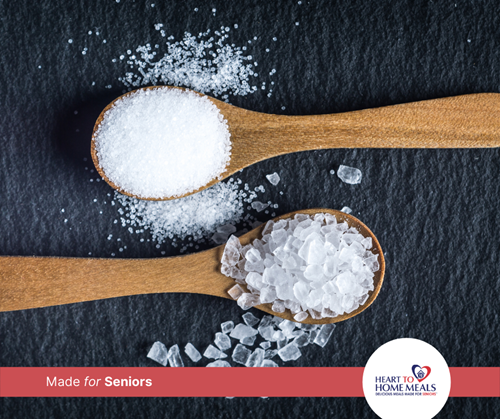
Getting older means paying a lot closer attention to our nutrition. By making sure we’re not eating too much (or too little) of certain things, we can maintain health, mobility, and quality of life for a much longer time. When it comes to protein and vitamins, our focus might be on making sure we’re eating enough. However, when it comes to salt, how much we should be having becomes a little trickier.
As you probably know, too much sodium in your diet can be unhealthy -- particular in seniors. Over-consumption of salt is linked to everything from dehydration to high blood pressure and heart problems. Making sure you’re not eating too much salt is an important step when considering your healthy diet.
On the flip side, making sure you’re getting enough salt in your diet is an important part of staying healthy. As we get older, tastes change, and our meal plants can become very routine if we’re not careful. Over a long period of time, if your diet doesn’t contain much salt it’s possible to develop a sodium deficiency, which is associated with nausea, confusion, extreme tiredness, headaches and more.
All this means is that there is a (pardon the pun) sweet spot when it comes to salt, and knowing what’s in your meals is a great place to start. Here’s what you need to know.
What to know about eating too much salt
Food needs seasoning to demonstrate all its flavours -- and salt is a big part of that. Yet, oftentimes processed food, pre-packaged and takeout meals go overboard with salt as a cheap and easy way to make their food taste “good.” Even if you enjoy the taste of very salty food, eating it too frequently isn’t good for you.
The short-term symptoms can be fairly benign, but still uncomfortable. For instance, sodium makes us retain water, and eating too much of it can make you feel bloated, and your skin feel puffy. And because salt pulls water out of your cells, it can make you feel thirsty when eaten in large quantities, and over time dehydrate you. Dehydration can be a real concern for seniors, especially those on certain medications, so monitoring your salt intake is extra important.
Over the longer term, excess salt intake is associated with everything from heart failure and stroke, to cancer and kidney stones. Prolonged over-consumption can have a very negative impact on anyone’s health, and particularly seniors.
Sources of excess salt can be a little sneaky sometimes. While everyone knows salty French fries and hamburgers are excessive, canned soup can be extremely high in sodium too. In one half-cup serving of a popular chicken noodle soup brand, there is 480mg of sodium -- about a third of your entire recommended daily intake. Make sure to check the labels of your food so you can keep tabs on how much you’re getting.
Getting enough salt is still an important part of your diet
On the flip side, making sure you have enough salt in your diet is an important part of your health, just like getting enough protein or vitamin C. You don’t need much, but even seniors are recommended to have 1200mg per day. Having enough salt is important for maintaining energy levels, cognitive function and mood.
Having a salt deficiency is called hyponatremia, and it can have very negative health consequences, particularly in seniors, where it is more common than in younger folks. Seniors are more likely to have a sodium deficiency if they’re on medication that makes you urinate more frequently (called a diuretic), take certain kinds of antidepressants, or have thyroid conditions. If any of these factors apply to you, keep a close eye on your sodium!
For seniors who are looking to reduce their salt intake, using a sodium replacement can seem like a good idea. Potassium Chloride tastes very similar, but it does not fill the important role sodium plays in your body’s health, and an over reliance on salt replacements can lead to deficiencies. Additionally, because of its high potassium content, this salt replacement can actually be dangerous to seniors. In our older years, our kidneys become less efficient at processing potassium. A buildup of this mineral can lead to severe heart complications, which makes Potassium Chloride a particularly bad salt replacement.
Heart to Home Meals is here to help you manage your sodium intake
At Heart to Home Meals, we’re not simply focused on offering delicious and easy meals -- we’re also focused on how they can be an important part of your health maintenance. For seniors who are trying to reduce their salt intake, look for meals which are part of the Heart to Home Meals Low-Sodium Diet Code HERE.
----------------
Regardless of your specific dietary needs, all of our meals have the nutrition information easily available to help you make the health-conscious choice, while still being able to look forward to your meal.
Do you have questions about senior nutrition? Download our FREE eBook to learn more: Click here to Download NOW!
Don’t forget to "Follow" and "Like" us on Facebook


